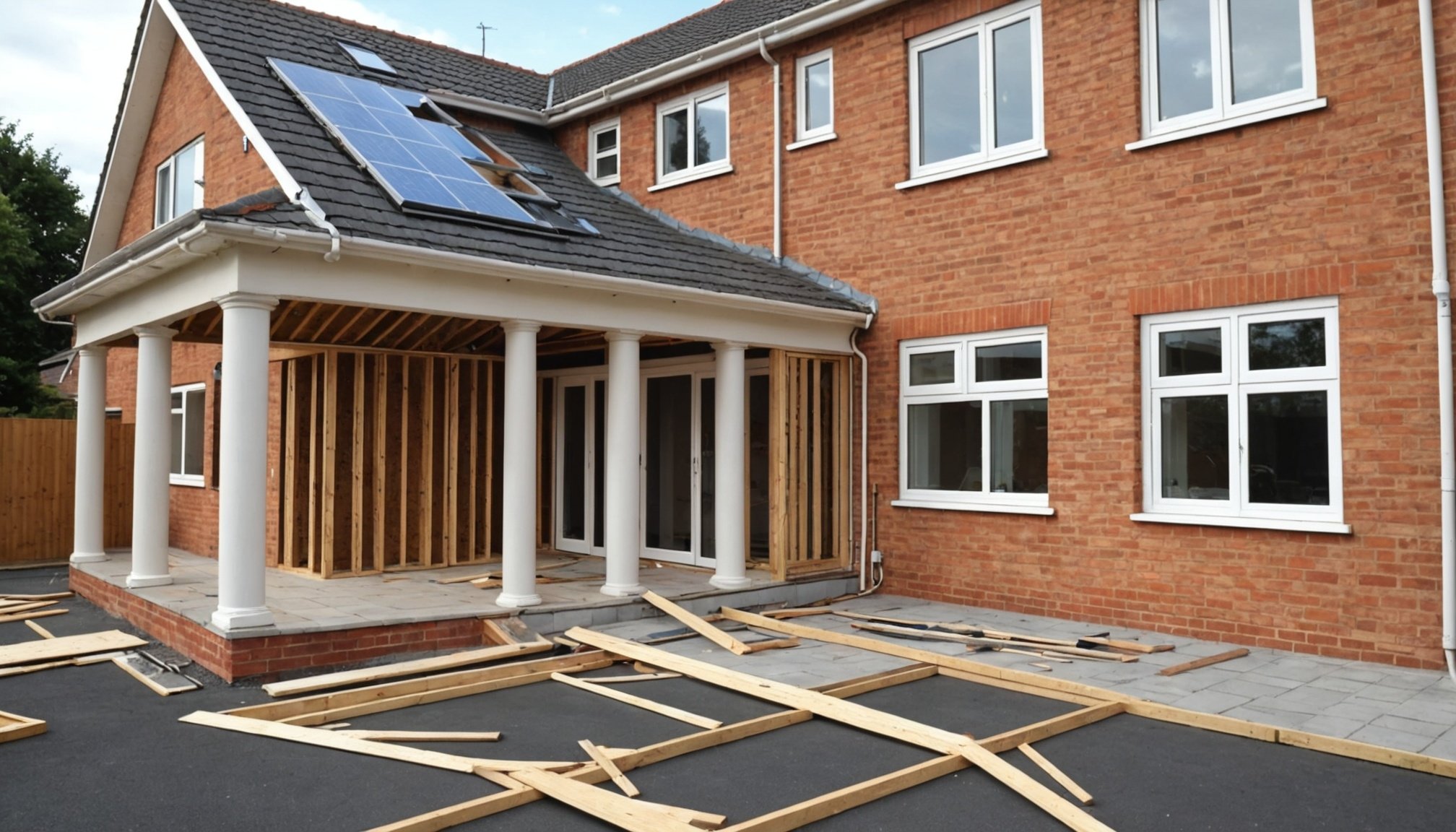Overview of Insurance Needs for Home Renovation Businesses
Insurance is a vital component for businesses in the home renovation sector, especially within the UK. This industry is inherently fraught with unique risks including property damage, theft, and on-site accidents. Having the right insurance coverage not only protects businesses from unforeseen financial strain but also instills confidence in clients who trust their homes to be in safe hands.
In the UK, there are statutory obligations that construction and renovation businesses must adhere to regarding insurance. One of the primary requirements is employer’s liability insurance, obligatory for companies hiring staff, to protect against any claims from workplace injuries or illnesses. Another critical type of coverage is public liability insurance, which safeguards businesses in case a third party sustains injury or property damage during the renovation project.
Additional reading : Key guidelines for uk organic skincare brands to navigate product safety regulations successfully
Meeting these UK insurance requirements ensures that home renovation businesses are compliant with legal standards while providing an essential safety net against potential liabilities. Understanding and securing the necessary insurance not only mitigates risks but can also be a differentiator in an industry where trust and reliability are paramount. Proper coverage thus supports operational continuity and professional credibility in the competitive renovation landscape.
Public Liability Insurance
Public liability insurance plays a crucial role in managing risks associated with renovation projects. It covers damages and legal costs that might arise if a third-party is injured or their property damaged during the project. This protection is vital for contractors, builders, and homeowners alike, as it safeguards against unpredictable and potentially costly third-party claims.
Also to read : Ultimate blueprint for kickstarting your fitness tech venture in the uk: key strategies for achieving success
The importance of public liability insurance lies in its ability to prevent financial strain by covering expenses that can arise from such unforeseen events. If, for instance, a passerby is injured by falling debris from a renovation site, the insurance would cover medical costs and any legal fees tied to the incident.
Real-world examples illustrate the impact of claims on projects. Consider a scenario where a construction tool inadvertently damages a neighbour’s car. Without public liability insurance, covering repair costs could severely affect project budgets and timelines. However, with appropriate coverage, these financial burdens are alleviated, ensuring smoother project progression.
Securing renovation project coverage not only offers peace of mind but also fosters trust among clients. By demonstrating proactive risk management, you enhance your reputation and assure clients of your commitment to safety and professionalism.
Employer’s Liability Insurance
Employer’s liability insurance is a mandatory requirement for businesses in the UK, protecting employers against claims from employees who sustain injuries or illnesses due to their work. It’s essential for protecting both the business and the employees.
Legal Requirements
In the UK, it’s a legal necessity for most employers to possess a minimum of £5 million in employer’s liability insurance. This requirement ensures that businesses are prepared to handle potential claims, providing employee protection in case of workplace incidents. Non-compliance can result in significant fines, potentially amounting to £2,500 for each day that the company operates without appropriate coverage.
Coverage Specifics
Employer’s liability insurance covers a wide range of incidents, including accidents, occupational diseases, and injuries that occur either on-site or as part of job duties elsewhere. It ensures that employees are compensated for medical expenses, any loss of income, and other related costs while protecting employers from having to bear such financial burdens directly.
Consequences of Non-Compliance
Failing to possess adequate coverage can lead to not only financial penalties but also damage to a company’s reputation. Businesses that neglect this legal requirement risk facing employee lawsuits, which could result in severe financial losses and operational disruptions.
Professional Indemnity Insurance
Professional indemnity insurance is crucial for renovation professionals, safeguarding against claims of negligence or misconduct in their expert services. When something unexpectedly goes awry in a renovation project, such as a design error or an overlooked detail in structural calculations, this insurance offers financial protection.
Contractors may face situations where contractor liability becomes a real concern. For example, if a client’s expectations aren’t met due to perceived errors, the legal and financial implications can be daunting. Professional indemnity insurance steps in to cover legal costs and any compensation claims, protecting both the contractor and their business.
Selecting the proper level of coverage is vital for effective risk management. Consider the following tips for choosing the right coverage:
- Evaluate project size and complexity: More complex or larger projects might necessitate higher coverage.
- Review past project outcomes: Identify potential risks based on previous work.
- Determine industry standards: Understand typical claims and statutory requirements within your field.
By carefully assessing specific project needs and industry benchmarks, contractors can acquire insurance that meets their unique requirements, offering peace of mind and robust protection in their professional endeavours.
Other Relevant Insurance Policies
When operating a renovation business, it’s crucial to consider types of specialized coverage that can safeguard against unexpected setbacks. Tools and equipment insurance protects the essential items your business relies on daily. In case of damage or theft, having this insurance ensures that you can quickly replace or repair these tools, minimizing disruptions and keeping projects on schedule.
Another vital coverage is business interruption insurance, which compensates for lost income during unforeseen interruptions. Should a fire or major damage occur, this policy covers ongoing expenses and potential revenue loss. This ensures that your financial stability is maintained while renovations are underway.
For those hands-on in the industry, personal accident and health insurance is a necessity. Renovation work can involve risks, and this insurance provides peace of mind by covering medical expenses and offering income support during recovery periods. By including these insurance policies, renovation businesses can operate with confidence, knowing they are well-prepared for various challenges.
Evaluating and integrating the right mix of insurance policies is a fundamental step, ensuring that every aspect of the business is protected, allowing for smooth operation even in the face of adversities.
Potential Pitfalls of Underinsurance
Underinsurance in the renovation business can lead to severe consequences that jeopardize entire projects. It exposes businesses to financial risks, especially when unexpected events occur. For example, damage to property or equipment theft might occur, leaving a business without the means to continue a project. Insurance typically covers these events, but an inadequately covered business will face out-of-pocket expenses, potentially leading to financial strain or bankruptcy.
Risks of Underinsurance
The risks of underinsurance are amplified by the unpredictable nature of renovation projects. Unexpected structural issues can arise, such as discovering asbestos, which necessitates immediate, costly action. Being underinsured often means these surprise costs fall entirely on the business, straining resources and affecting project timelines.
Using precise analyses helps identify underinsurance risks. Implementing thorough assessments can aid in addressing these risks effectively. Strategies might include reviewing policy limits, comparing them against project needs, and ensuring that coverage extends to all aspects of the renovation work. Additionally, consulting with insurance experts for tailored recommendations can fortify a business against the challenges that underinsurance poses. Through proactive strategies, renovation businesses can safeguard against the potential pitfalls of being underinsured.
Cost Considerations for Insurance Policies
Understanding the costs of renovation insurance is vital for effective budget planning. Insurance policy costs can vary widely based on several factors. The scope of renovation significantly influences the premium: larger, more complex projects tend to have higher associated costs due to increased risk. Additionally, geographic location plays a crucial role; areas prone to natural disasters often command higher premiums.
Incorporating insurance expenses into your budget requires strategic planning. Prioritize understanding your specific coverage needs, then obtain several quotes to compare. This will ensure you’re getting competitive rates. It’s prudent to evaluate not only the costs but also the terms and conditions of each policy. Ensuring that the policy provides adequate coverage for potential risks is crucial.
When considering business operations, factor insurance into both immediate costs and long-term financial planning. Consistently reviewing and adjusting your budget to reflect any changes in coverage needs can prevent unexpected financial strain. Pay attention to the policy details: exclusions, policy limits, and deductibles can significantly impact how much you pay and what is covered. Adopting a meticulous approach to selecting and managing renovation insurance will promote financial stability.
Regulatory Requirements and Compliance
Navigating the complex landscape of UK insurance regulations is critical for renovation businesses. The industry is governed by a suite of laws designed to safeguard stakeholders and ensure fair practices. To stay compliant, it’s essential to focus on both understanding and implementing these regulations effectively.
Firstly, businesses must identify the specific insurance requirements applicable to their operations. This typically involves general liability insurance, employer’s liability, and possibly professional indemnity insurance, depending on the nature of services offered.
Ensuring compliance for renovation businesses involves taking several steps. Begin by conducting a comprehensive review of current policies to identify gaps. Partnering with a knowledgeable insurance broker can greatly assist in tailoring the right coverage. Keeping records meticulously updated and regularly reviewing insurance terms ensures sustained compliance.
Failure to meet regulatory requirements can lead to severe consequences. Non-compliance may result in hefty fines, legal disputes, or even the suspension of business operations. Moreover, it can damage a company’s reputation, leading to loss of clients and revenue.
Ultimately, dedication to compliance not only avoids legal pitfalls but also fosters trust and reliability within the market. Regular training and updates on regulatory changes can empower your team to maintain high standards.
Selecting the Right Insurance Provider
When choosing an insurance provider for your renovation business, several criteria can help you make an informed decision. Start by examining the provider’s industry experience. An insurer familiar with the renovation sector can offer tailored policies that address specific risks.
Next, scrutinise customer reviews as they provide insights into the provider’s reliability. Positive reviews often indicate responsive customer service and satisfaction.
Negotiating terms is crucial to securing a fair deal. Engage in discussions regarding premiums, deductibles, and coverage limitations. Don’t hesitate to ask questions—how flexible is the provider with policy adjustments? Demonstrating your willingness to understand and discuss these factors might favourably influence the terms offered.
Additionally, forming long-term relationships with insurers can be beneficial. It often leads to streamlined processes and potentially better rates over time due to loyalty and trust.
Recommendations for selecting the right provider include:
- Evaluating their expertise in renovation business insurance.
- Weighing feedback from previous clients.
- Prioritising open communication for terms negotiation.
By carefully considering these aspects, you can ensure a partnership that supports your business’s continued success.
Real-World Examples and Case Studies
Understanding the significance of insurance through real-world experiences can make a difference in your renovation projects. In successful renovation projects, having the right insurance prevented financial pitfalls and allowed for smooth progress.
One remarkable insurance case study involves a couple undertaking a home renovation. Initially hesitant, they invested in a comprehensive renovation insurance policy. When unforeseen structural issues were discovered, the insurance covered additional costs, sidestepping what could have been a significant financial burden.
Learning from notable insurance claim cases, we see how pivotal insurance can be. For instance, in another case, a homeowner initiated renovations without adequate coverage, assuming no complications would arise. A sudden mishap leading to water damage resulted in substantial expenses, highlighting the importance of foresight in insurance decisions.
These home renovation insurance stories showcase the need for proactive planning and investment in suitable insurance policies. Real-world experiences emphasize that selecting appropriate insurance not only protects against unforeseen events but also contributes to peace of mind and financial stability during the renovation process.











